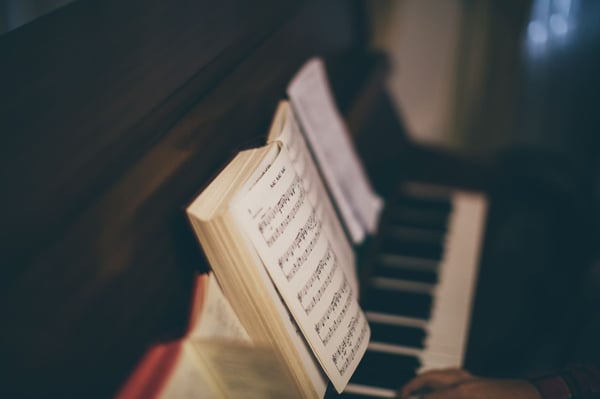by Michael Lydon

There are songs so sweet, we love to hear their music,
Old songs, so dear, so true,
Songs we sing along, songs we sing alone,
Songs both sunny and blue.
–“A Little Song for You” words and music by Michael Lydon
Okay everybody, I’ve been writing this column for almost four years, and I’m finally ready to make an earthshaking proclamation. Are you ready? Got your hiking boots strapped on, crunchy granola in a knapsack on your belt, sunglasses, extra socks, sunblock? Okay, here goes:
Writing songs is the best fun in the world!
Yes, it’s fun to kick the winning goal in a soccer championship match, fun to roast hot dogs as the sun sinks into the lake at the end of summer, fun to coast downhill on your bike with a huge grin on your face and a cry of “wheeeeee” echoing from the hill tops, but I still say, “Writing songs is the best fun in the world.”
Why is writing songs so much fun? There are so many reasons that I’m not going to try to put them some strict kind of order—I’ll just write them down as they pop into my brain.
Writing songs is fun because it’s still writing! All the fun we can have writing prose, we can still have writing music, setting old words to new melodies, rhythms, and rhymes. Searching for words to suit a melody adds to the challenge of writing; so does searching for a melody to suit the words.
Writing songs is fun because it is, in part, brainy homework, sitting down at your desk, pen in hand, trying one idea, scratching it out, then trying a new idea that still has little fragments of the old idea. Writing songs is fun because it is, in part, emotion work, taking a long walk in the woods, remembering a long lost love, and scribbling down new lyrics as you brush salty tears from your eyes. Sometimes writing songs is solo work, you battling your way to a finished masterpiece, but you may someday meet a congenial soul with whom you get together with Saturday afternoons for sessions swapping ideas (it didn’t hurt Lennon and McCartney!).
Writing songs is fun because you hope people from your hometown, your school, your church group may someday hear this song you are wracking your brains over to finish, and they’ll be surprised and impressed by the talent that they didn’t know you had. And if enough people buy your downloads and concert tickets, you may be on the way to earning your living by working on something you love, one of the truest and most trusty paths to human happiness.

Above all, writing songs is fun because it helps you find a way to communicate with other humans, a fluid medium we can use to share our ideas, feelings, and dreams. I know that, for me, this is the greatest joy of songwriting: soul to soul communication with my neighbors on my block and my neighbors from cities and villagers from around the world. Words make their contribution, so do melody, rhythm, vocal and instrumental timbres and harmonies, and so too do all the hours of music study I’ve put in to see how Mozart, Beethoven, Puccini, Duke Ellington, Aretha Franklin, and so many more devoted their lifetimes to writing songs that still stir my hungry soul.
Now let’s take a look at a few of the songs you are working on:
Anissa Griffith’s sardonic lyrics for her song, “Umbrella” reminds me of the best songs of Bob Dylan:
I’m never there when you want me to be
I never get the message that you need me to receive
I always ask the questions when you have yours too
I never have an umbrella when it rains on you
So I don’t get why you want me to stay
If I were you, I’d have it the other way
Oscar_Locke from Australia presents a poem/lyric with a classic verse-chorus structure:
verse one
the trees hold us there
your skin bare on black oak
every fir outstretched
cavernous, bridal
the conifers call out
as birds fill the air,
forked tails, tongued
flute songs and love
get lost in the woods
just to hear you again
chorus
‘cause maybe the world is ending
like every root bends
i slipped on your stare
and the memory of faces on hands
catches me, splits me
baby, we’re bucks
hooves on moons
antlers curled
dancing…
I like the tree images of the verse and how the poet-lyricist confesses in the chorus that he wants to get lost in the woods just to hear wild bird songs again, but I think this is more a poem than a song. I’m hearing more chant than melody, and in a song I want melody! Deciding what is a poem, and what is a song lyric is a tricky business, and has been tricky since Homer first strummed his lyre—was he singing a song or was he writing a news report on a foreign war? I suggest that you spend little time and effort on the matter—you’ll never find a definitive answer—although you could think of it this way: a poem does not have to conform to any musical structures, whereas lyrics do. I strongly urge you to sing, cry, shout, whisper, laugh, scream your lyrics—not so that you’ll find their one and only tone of voice, but as a way to find their hidden emotional music.

Jai sabnis’s (India) lyric/poem “Bittersweet” has a bouncy, driving rhythm that suits the frank portrait of a hard-working guy who lugs bags of cement for a living, but is getting so tired he’s looking for a new line of work:
Hey did you hear something crack
Hopefully, it’s just a fracture
Something’s broken: my spirit or my back
But can’t get fired by the contractor
So I keep lugging that cement
All day long
Gotta make sure I get that 50 cent
But you know my arms ain’t that strong
Worked 12 hours a day
God it just feels so long
Sometimes I just wanna get away
(pause)
I spend the day laying bricks and waiting…
In strong contrast to Bittersweet’s rap, The Shadow from Turkey offers us a romantic song, “Like I Love You,” and when I heard her chorus, I suddenly wanted to hear banks of violins and an angelic choir:
[Chorus]
Oh baby, don’t let our love fade,
Like a beautiful flower.
‘Cause I know every pretty thing has a short time,
But I don’t want this to be over.
I love you more than you think,
Don’t let me down,
I won’t let you down
These few excerpts are the merest, the barest beginning, the tiniest taste of lyrics that fill books, records, computers, flash drives, and our own memories and imaginations. So, need I say more? Have I won my case? Is writing songs the best fun in the world?
The Beatles said it best: “Yeah, yeah, yeah!”
—-
About Michael Lydon
Michael Lydon is a writer and musician who lives in New York City. Author of many books, among them Rock Folk, Boogie Lightning, Ray Charles: Man and Music, and Writing and Life. A founding editor of Rolling Stone, Lydon has written for many periodicals as well, the Atlantic Monthly, New York Times, and Village Voice.
He is also a songwriter and playwright and, with Ellen Mandel, has composed an opera, Passion in Pigskin. A Yale graduate, Lydon is a member of ASCAP, AFofM local 802, and on the faculty of St. John’s University.



